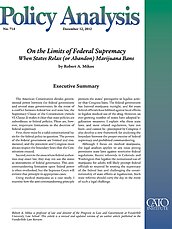The American Constitution divides governmental power between the federal government and several state governments. In the event of a conflict between federal law and state law, the Supremacy Clause of the Constitution (Article VI, Clause 2) makes it clear that state policies are subordinate to federal policies. There are, however, important limitations to the doctrine of federal supremacy.
First, there must be a valid constitutional basis for the federal policy in question. The powers of the federal government are limited and enumerated, and the president and Congress must always respect the boundary lines that the Constitution created.
Second, even in the areas where federal authorities may enact law, they may not use the states as instruments of federal governance. This anticommandeering limitation upon federal power is often overlooked, but the Supreme Court will enforce that principle in appropriate cases.
Using medical marijuana as a case study, I examine how the anti-commandeering principle protects the states’ prerogative to legalize activity that Congress bans. The federal government has banned marijuana outright, and for years federal officials have lobbied against local efforts to legalize medical use of the drug. However, an ever-growing number of states have adopted legalization measures. I explain why these state laws, and most related regulations, have not been—and cannot be—preempted by Congress. I also develop a new framework for analyzing the boundary between the proper exercise of federal supremacy and prohibited commandeering.
Although I focus on medical marijuana, the legal analysis applies to any issue pitting permissive state laws against restrictive federal regulations. Recent referenda in Colorado and Washington that legalize the recreational use of marijuana for adults will likely prompt federal officials to respond by touting the supremacy of the federal ban and challenging the constitutionality of state efforts at legalization. Such state reforms should carry the day in the event of such a legal challenge.
About the Author

This work is licensed under a Creative Commons Attribution-NonCommercial-ShareAlike 4.0 International License.
